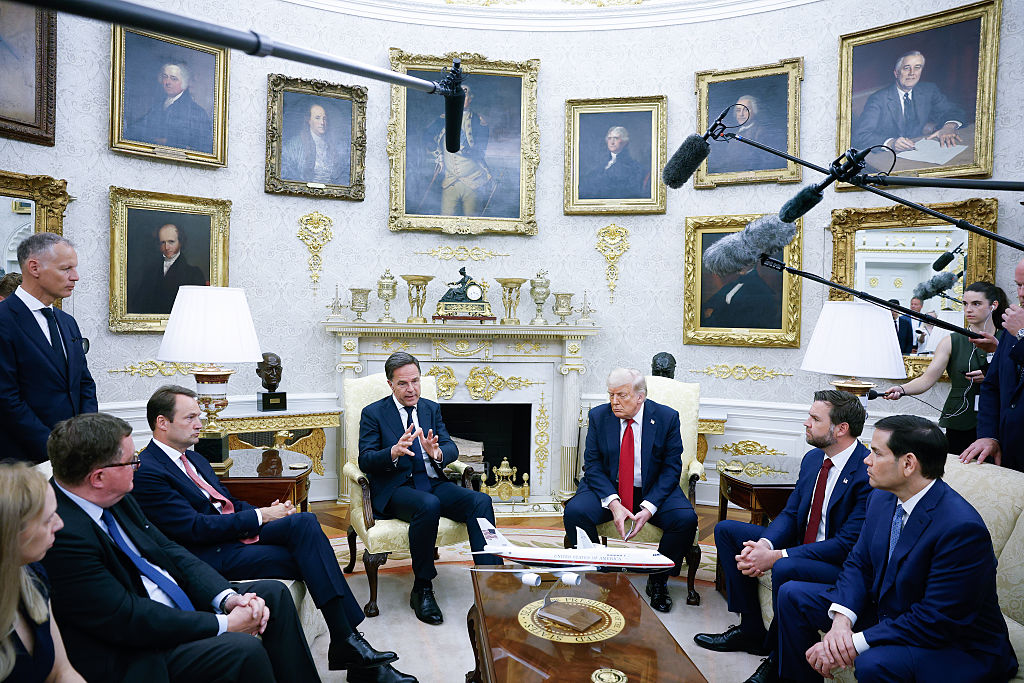David Cameron, bless him, is back striding the world stage. He wrote an article last week in Washington’s inside-beltway website the Hill, urging Congress to vote for more aid for Ukraine. The UK foreign secretary’s tone in that article was forthright in a way that, I expect, he imagined to be the tough talk of a respected international elder statesman getting down to brass tacks. Rather than, say, the stamping of a butterfly in Kipling.
“As Congress debates and votes on this funding package for Ukraine,” he wrote, “I am going to drop all diplomatic niceties… I do not want us to show the weakness displayed against Hitler in the 1930s. He came back for more, costing us far more lives to stop his aggression.” Was that really going to have the effect he imagined?
Leaving aside that diplomatic niceties are what diplomacy is for, it’s a little hubristic to lecture the Americans on foreign policy; not least when the cliché you instinctively reach for is the appeasement of Germany before World War Two. Even the historically challenged among his readers will remember that the most notorious appeaser of Hitler was a British prime minister rather than an American president.
As Dominic Lawson points out pithily in the Sunday Times of London, it may well also have been counterproductive. There’s nothing quite like making you not want to do something — be you an overtired toddler or the world’s only hyperpower — as being told to do it by someone who claims to know better. I believe it’s related to what cognitive psychologists call the “backfire effect.” Outside the academic literature, the phenomenon has been crisply explored by Rage Against the Machine in the chorus of their 1992 banger “Killing in the Name.”
If the bill does make its way through the House in the end, then, there’s not the slightest chance that it will be because of Lord Cameron’s intervention rather than in spite of it. And that intervention won’t be forgotten. It may have taken someone as blunt as Marjorie Taylor Greene to say Cameron “can kiss my ass” out loud, but many of the Republicans who may soon be in power will have thought it. As Lawson pointed out, Lord Cameron of all people should have recognized the dangers of this sort of presumptuous transatlantic telling-off. He cooked up an intervention by Barack Obama in the run-up to the Brexit vote (Obama told us that post-Brexit Britain would be at the back of the queue for a trade deal) which may well have encouraged waverers to vote for Brexit just to spite Obama.
Personally, I was put at once in mind of what has long seemed to me the funniest and most instructive ever such instance of this sort of goof. Cast your mind back, if you will, to what will now seem like halcyon days: the 2004 presidential election, in which George W. Bush was up for re-election against John Kerry. In the years following the Iraq invasion, George Dubya was unpopular with bien pensant types in the UK, and the prospect of his re-election filled us metropolitan liberal elites with horror. (We at this point had no idea that we would one day look back on his presidency as a time of dignified statesmanship.)
Something, it was thought, must be done. So it was the brainchild of Ian Katz, then a section editor of the Guardian, to encourage his rope-soled readers to write en masse to the voters of Clark County, Ohio — which psephologists had identified as a vital marginal electorate — telling them why it was their duty to posterity to vote for John Kerry. This, these boobies solemnly did. The reaction was a thing of beauty. It’s much to Katz’s credit (journalism’s first duty being, after all, to mayhem) that the paper printed a selection of such responses as were suitable for a family newspaper.
“Have you not noticed that Americans don’t give two shits what Europeans think of us? Each email someone gets from some arrogant Brit telling us why to NOT vote for George Bush is going to backfire, you stupid, yellow-toothed pansies”; “HEY, SHITHEADS, REMEMBER THE REVOLUTIONARY WAR? REMEMBER THE WAR OF 1812? WE DIDN’T WANT YOU, OR YOUR POLITICS HERE, THAT’S WHY WE KICKED YOUR ASSES OUT”; “Real Americans aren’t interested in your pansy-ass, tea-sipping opinions. If you want to save the world, begin with your own worthless corner of it”; “Mind your own business. We don’t need weenie-spined Limeys meddling in our presidental election. If it wasn’t for America, you’d all be speaking German”; “Please be advised that I have forwarded this to the CIA and FBI”; “I hope your cynical ploy blows up in your cowardly faces, you bunch of mealy-mouthed morons!” And so on.
Every time I need cheering up, I reread that page of responses and laugh until the tears roll down my cheeks. They seem to me to convey a profound truth about the Special Relationship, not to mention that part of rhetorical art that Aristotle called “ethos.” Would that Lord Cameron, too, had had that page bookmarked. Did Ian Katz and the Guardian inadvertently tip the scales in that close-fought election? That’s a matter for historians — Wikipedia, at least, seems to think it was Ohio that made the difference — but I very much like to believe that they did.
The energetic and imaginative Katz moved on to start a career in television and is now head honcho at Channel 4. You can’t keep a good man down. And though his triumphs there are admired all over Britain, for my money he will struggle — and who wouldn’t? — ever to do anything as scintillating in public life as possibly accidentally changing the course of history to hand George W. Bush four more years.
Who knows, had it not been for that inflection point in 2004, the world might have clattered down a quite different set of tram lines — and we’d even now be in a sunnier timeline where Lord Cameron was not calling on Congress to vote more aid for Ukraine’s defense against a Russian war of aggression… and Congress had no need for such a vote in the first place. Yet here we are. The butterfly effect, indeed.
This article was originally published on The Spectator’s UK website.


























Leave a Reply